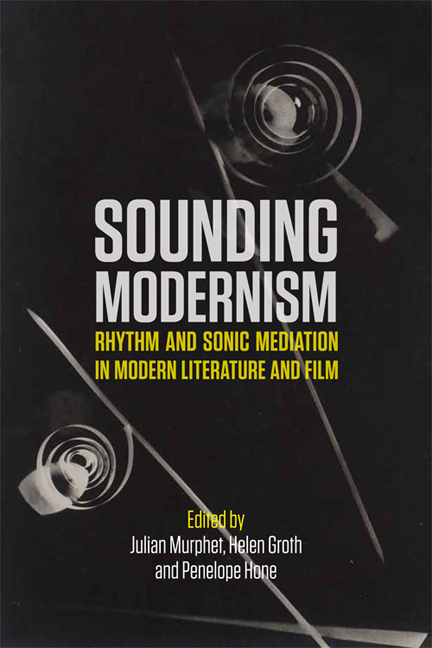Book contents
- Frontmatter
- Contents
- Acknowledgements
- 1 Introduction: Sounding Modernism 1890–1950
- Part One Writing Modern Sound
- Part Two Mediated Voices
- Part Three Difficult Voices
- 9 Harsh Sounds: George Gissing's Penetrating Literary Voice
- 10 Body and Soul: Modernism, Metaphysics, Rhyme
- 11 Listening to the Late Cantos
- Part Four Modern Rhythm: Writing, Sound, Cinema
- Notes on Contributors
- Bibliography
- Index
11 - Listening to the Late Cantos
from Part Three - Difficult Voices
Published online by Cambridge University Press: 22 December 2017
- Frontmatter
- Contents
- Acknowledgements
- 1 Introduction: Sounding Modernism 1890–1950
- Part One Writing Modern Sound
- Part Two Mediated Voices
- Part Three Difficult Voices
- 9 Harsh Sounds: George Gissing's Penetrating Literary Voice
- 10 Body and Soul: Modernism, Metaphysics, Rhyme
- 11 Listening to the Late Cantos
- Part Four Modern Rhythm: Writing, Sound, Cinema
- Notes on Contributors
- Bibliography
- Index
Summary
Titter of sound about me, always
(Canto 5)In the early 1950s, Ezra Pound, a seasoned student of languages who had famously brought a copy of Confucius and a Chinese-English dictionary to the Disciplinary Training Centre outside Pisa in 1945, complained of the difficulties he was experiencing in learning to speak Chinese. In a letter to the Harvard-based Sinologist Achilles Fang, Pound wrote that he found Chinese to be ‘fer somethings the most precise and, in fact, only satisfactory medium for making certain statements’, but that it was also ‘the most damblasted and DAMbiguous modus loquendi, wot yu cant bust open with a meat AX’. Only late in his life, with all the spare time that incarceration in a psychiatric hospital allowed, did Pound make a serious attempt to learn the spoken words of a language that he had been reading and translating for over thirty years. By 1951 he included himself among the number of ‘pore mutts trying to learn a little chinese, esp/ SOUND’.
Pound's awareness that Chinese can indeed be spoken was, to be sure, a belated revelation. The cantos that Pound wrote in the 1950s constitute one of the last seismic shifts in The Cantos as a whole: for the first time, the Chinese character is present not only as an organisational concept or a structural principle, but as a major medium of writing and representation in its own right. This new awareness of Chinese phonetics is part of a broader restructuring in the late poems of the role and possibilities of sound. Yet when writing about the late cantos, and especially their heavy use of Chinese characters, critics have tended to think of the late poems in terms of a divide between the aural and the visual, which has meant that sound in the late cantos has received little critical attention. In an early review of Section: Rock- Drill, Dudley Fitts wrote:
The Chinese, like the (I suppose) Egyptian hieroglyphs at the beginning of Canto 93, the medieval musical notation in Canto 91, and the fragments of Greek, Latin and other languages disject and stream throughout the text – these … are romantic doodles – like the compulsions of a man so fascinated by the contours of a Greek word that he is constantly jotting it down on envelopes and tablecloths and the rocky skulls of his children.
- Type
- Chapter
- Information
- Sounding ModernismRhythm and Sonic Mediation in Modern Literature and Film, pp. 164 - 178Publisher: Edinburgh University PressPrint publication year: 2017

